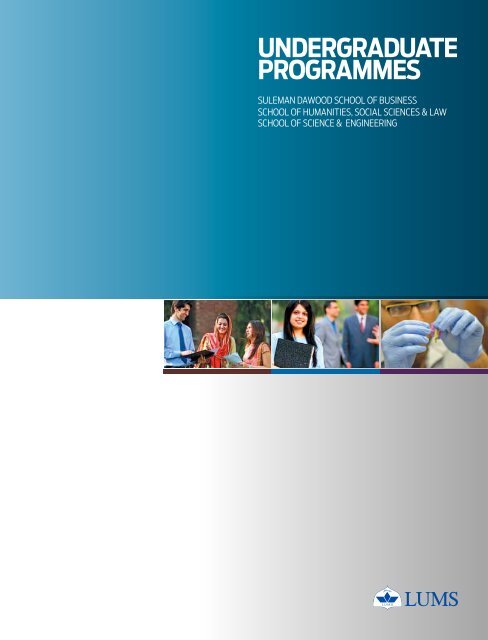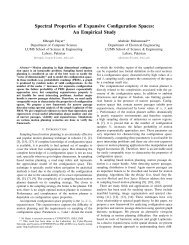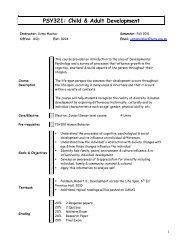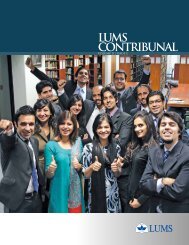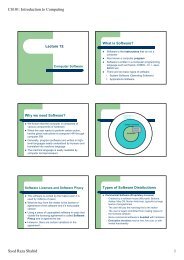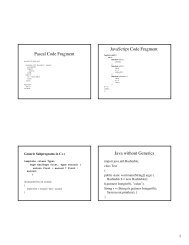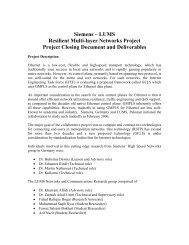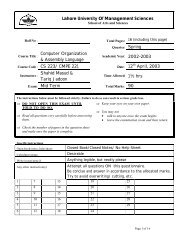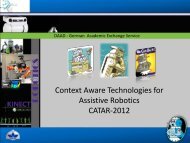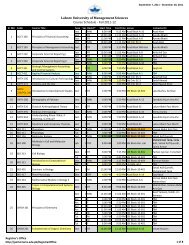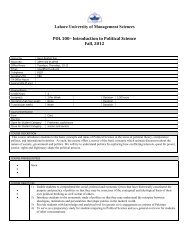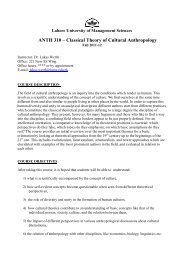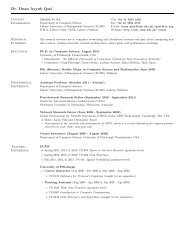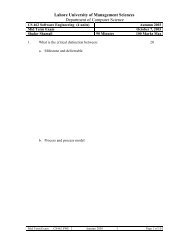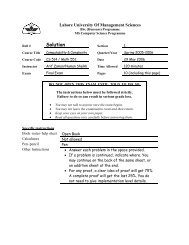undergrAduAte PrOgrAMMeS - Lahore University of Management ...
undergrAduAte PrOgrAMMeS - Lahore University of Management ...
undergrAduAte PrOgrAMMeS - Lahore University of Management ...
Create successful ePaper yourself
Turn your PDF publications into a flip-book with our unique Google optimized e-Paper software.
undergrAdUate<br />
PROGRAMMES<br />
Suleman Dawood school <strong>of</strong> business<br />
school <strong>of</strong> humanities, social sciences & law<br />
School <strong>of</strong> Science & Engineering
2<br />
undergraduate<br />
programmes<br />
LUMS<br />
The <strong>University</strong><br />
The <strong>Lahore</strong> <strong>University</strong> <strong>of</strong> <strong>Management</strong> Sciences<br />
(LUMS) was established in 1985 by sponsors belonging<br />
to the country’s leading private and public sector<br />
corporations. LUMS is recognised as a premier centre<br />
<strong>of</strong> learning in the region and envisions “to become a<br />
21st century <strong>University</strong> whose research, service, and<br />
graduates are a fountain <strong>of</strong> leadership for Pakistan and<br />
the world.” LUMS has a diverse portfolio, with three<br />
schools <strong>of</strong>fering a range <strong>of</strong> academic programmes.<br />
Academic Programmes<br />
Suleman Dawood<br />
School <strong>of</strong> Business<br />
l PhD <strong>Management</strong><br />
l Operations <strong>Management</strong><br />
l<br />
l<br />
l<br />
l<br />
l<br />
l Organisational<br />
Behaviour/Strategy &<br />
Organisation<br />
Executive MBA<br />
MBA<br />
BSc (Honours)<br />
l Accounting & Finance<br />
l <strong>Management</strong> Science<br />
Executive Programmes<br />
Social Development<br />
Programmes<br />
School <strong>of</strong> Humanities,<br />
Social Sciences & Law<br />
l MSc Economics<br />
l BA-LL.B<br />
l BA (Honours)<br />
l Humanities<br />
l History<br />
l BSc (Honours)<br />
l Economics<br />
l Politics & Economics<br />
l Anthropology & Sociology<br />
l Political Science<br />
School <strong>of</strong> Science &<br />
Engineering<br />
l PhD<br />
l Computer Science<br />
l Computer Engineering<br />
l Mathematics<br />
l MS<br />
l Computer Science<br />
l Computer Engineering<br />
l BS<br />
l Biology<br />
l Chemistry<br />
l Computer Science<br />
l Electrical Engineering<br />
l Mathematics<br />
l Physics<br />
LUMS UNDERGRADUATE PROGRAMMES<br />
Rigorous, Relevant, Multidisciplinary<br />
The focus <strong>of</strong> LUMS undergraduate programmes<br />
is to prepare individuals in not just their chosen field<br />
<strong>of</strong> specialisation but also to give them a holistic<br />
perspective that grooms them in technical know-how,<br />
general knowledge, ethics and character building.<br />
The focus is to:<br />
• Develop a spirit <strong>of</strong> learning and inquiry and a<br />
strong work ethic<br />
• Inculcate the highest standards <strong>of</strong> personal<br />
integrity, social responsibility, tolerance and<br />
respect for humanity<br />
• Promote an understanding <strong>of</strong> our cultural diversity<br />
and richness<br />
• Equip students with the knowledge, intellect and<br />
skills essential to succeed in future academic and<br />
pr<strong>of</strong>essional endeavours<br />
Hence, a sizable percentage <strong>of</strong> courses have to be<br />
selected from fields other than the major <strong>of</strong> choice:
undergraduate<br />
programmes<br />
3<br />
It is recognised that the choice <strong>of</strong> undergraduate programme has a lasting influence on the life and lifestyle<br />
<strong>of</strong> students well into adult life. At LUMS, it is our goal to provide a challenging, rewarding and enriching<br />
environment both in and outside classrooms. We strive to prepare our students not only for the job market on<br />
graduation, but to lead fulfilled, healthy lives as citizens and as individuals.<br />
The academic excellence <strong>of</strong> our programmes (which are among the best in the region, and compare well<br />
internationally) is well known. Less well known is our stress on a well rounded student, knowledgeable in more<br />
than just their chosen pr<strong>of</strong>ession. The aim <strong>of</strong> our broad-based curriculum is to give our student an enriched allround<br />
intellectual life because we recognise that universities must prepare students not only for the hours they<br />
spend at their jobs, but also for the many more hours <strong>of</strong> their leisure time and personal lives.<br />
Outside <strong>of</strong> the classrooms, LUMS works hard and thoughtfully to groom our students and provide enriching<br />
experiences.The Sports and Wellness department maintains sports facilities and organises events with wide<br />
participation. The goal <strong>of</strong> this department is to encourage long lasting habits <strong>of</strong> physical fitness; to introduce<br />
students to the pleasures <strong>of</strong> regular exercise that will not only work to maximise their academic performance<br />
but will provide a basis for a long and healthy life for decades after they graduate.<br />
We have an active extracurricular life on campus with student run societies for debates, dramatics, music,<br />
trekking, Model United Nations and many others. In each <strong>of</strong> these, students not only have enjoyable social/<br />
cultural experiences, but also have the opportunity to create, lead and develop their ‘s<strong>of</strong>t skills’. We try in the<br />
miniature society <strong>of</strong> LUMS to have all the facets <strong>of</strong> achievement and creativity that we would wish to see in our<br />
lives, in our country and our region.<br />
Most importantly, we try at LUMS to instill core values; the values <strong>of</strong> pursuit <strong>of</strong> excellence, <strong>of</strong> integrity, <strong>of</strong><br />
tolerance and social responsibility that are the bedrock <strong>of</strong> any successful family, institution and society. We aim<br />
to create a model that will serve our students and their communities not only for the time they are at LUMS but<br />
for decades in the future. We have a long way to go and much to learn and we are looking for leaders who wish<br />
to accept all these challenges.<br />
Yasser Hashmi<br />
Assistant Pr<strong>of</strong>essor, Department <strong>of</strong> Humanities and Social Sciences<br />
Associate Dean, Office <strong>of</strong> Student Affairs
04 SDSB<br />
SULEMAN DAWOOD<br />
SCHOOL OF BUSINESS<br />
Inspiring Business Excellence<br />
The Business School is the oldest school at<br />
LUMS and was established in 1986. The need for a<br />
challenging and relevant curriculum suggested the<br />
use <strong>of</strong> case studies rather than conventional lectures to<br />
impart knowledge. The school also carries out rigorous<br />
economic and management research through the<br />
Strategic Sectors Research Centre, Social Enterprise<br />
Development Centre and the Case and Research Centre.<br />
SDSB maintains a close relationship with the<br />
business world, which acts as a source <strong>of</strong> advice and<br />
information. This interaction not only helps to keep<br />
the curriculum relevant to the needs <strong>of</strong> business<br />
organizations, but also ensures that the students are<br />
exposed to the dynamics <strong>of</strong> the corporate world.<br />
SDSB Undergraduate Programmes<br />
One Degree – Endless Opportunities<br />
SDSB <strong>of</strong>fers BSc (Honours) in the following<br />
majors:<br />
• Accounting & Finance<br />
• <strong>Management</strong> Science<br />
Accounting &<br />
Finance<br />
Accounting and Finance are vital business<br />
operations and require knowledge and<br />
understanding <strong>of</strong> all functional areas <strong>of</strong> business.<br />
As such, Accounting and Finance are <strong>of</strong> critical<br />
importance to both public and private sector<br />
organisations.<br />
A major in Accounting and Finance provides<br />
students with a basis from which to continue<br />
their studies for a pr<strong>of</strong>essional degree or to serve<br />
as a valuable foundation for careers in business<br />
and management. The graduates <strong>of</strong> this major<br />
are prepared for careers in auditing, corporate<br />
accounting, management consulting, government,<br />
not-for-pr<strong>of</strong>it organisations, and taxation as well as<br />
trainee managers in organisations.<br />
The broad-based curriculum equips students<br />
with tools <strong>of</strong> intelligent analysis, planning, control<br />
and decision making.<br />
<strong>Management</strong> Science<br />
In response to the ever growing demand <strong>of</strong> a<br />
business major by applicants and recruiters alike,<br />
the SDSB has launched a new undergraduate<br />
major this year. Although employers emphasise<br />
on the basic technical and functional skills within<br />
the graduates, their attitude and willingness to<br />
work hard is equally important.<br />
Hence, an integrative course structure that<br />
includes general education, business core,<br />
analytical & technical rigour along with the use<br />
<strong>of</strong> mathematical & scientific models, serves the<br />
vision <strong>of</strong> the management science major.<br />
Lectures coupled<br />
with the Case<br />
Method <strong>of</strong> Teaching<br />
SDSB <strong>of</strong>fers a unique blend <strong>of</strong> multidisciplinary<br />
modes <strong>of</strong> teaching that fully utilize<br />
modern teaching techniques, conventional lecture<br />
method and the case method <strong>of</strong> learning, that<br />
is the hallmark <strong>of</strong> the SDSB. Video cases, class<br />
exercises and industrial visits are best examples<br />
<strong>of</strong> the teaching tools employed by instructors<br />
to enhance knowledge and provide first hand<br />
experience to its students.<br />
Usually, during the first two years, a rigorous
SDSB<br />
05<br />
Business leaders actively interact with<br />
both faculty and students through frequent<br />
visits, seminars and as guest speakers and<br />
their perspectives enrich the classroom<br />
experience. Additionally, industry linkages are<br />
strengthened by the involvement <strong>of</strong> faculty in<br />
teaching and training in the Rausing Executive<br />
Development Centre that caters to more<br />
than 2,000 senior executives and managers<br />
annually.<br />
The SDSB aims to provide for the varying<br />
educational needs <strong>of</strong> a culturally diverse and<br />
geographically dispersed student body with<br />
the goal <strong>of</strong> preparing students academically,<br />
personally, and pr<strong>of</strong>essionally for successful<br />
careers and to give them opportunities to<br />
make a difference.<br />
programme is followed whereby students<br />
are introduced to innumerable concepts<br />
and models. During the next two years, as<br />
this learning continues, students are also<br />
introduced to specific applications <strong>of</strong> what<br />
they have initially learnt, mainly through casebased<br />
learning schemes, industry visits, and<br />
in-depth projects and presentations.<br />
The integration <strong>of</strong> various techniques has<br />
scores <strong>of</strong> advantages. It inculcates in students<br />
an awareness <strong>of</strong> practical problems, which<br />
may not be explained theoretically. Secondly,<br />
it calls for active class participation. Along<br />
with improving their communication skills,<br />
this aggregate scoring component builds<br />
confidence in students to think on their feet<br />
and to present their ideas meaningfully. This<br />
rigorous approach leads to brain storming<br />
and idea generation that in turn, leads to the<br />
assimilation <strong>of</strong> various opinions and insights<br />
by different students and assists in group<br />
learning. Problem solving and team-building<br />
skills, awareness about pragmatic problems<br />
and insights into corporate cultures are some<br />
<strong>of</strong> the added advantages <strong>of</strong> this mode <strong>of</strong><br />
teaching that lead students to transform into<br />
well-groomed graduates with a pr<strong>of</strong>essional<br />
outlook and ready to face the real world<br />
challenges.<br />
Career Prospects<br />
The SDSB undergraduates are highly<br />
marketable individuals who are picked up<br />
readily by the industry in various roles. Their<br />
sound understanding <strong>of</strong> business models<br />
and technical skills coupled with their ability<br />
for sustained hard work under pressure,<br />
leadership potential and ability to think<br />
outside the box makes them a prime choice <strong>of</strong><br />
employers.<br />
ACF 2011 PLACEMENTS<br />
The BSc ACF Programme at LUMS<br />
has added a new dimension to the<br />
way I perceive work. It has evoked in<br />
me the hunger to achieve more and<br />
to polish and variegate my skills. The<br />
courses provided us with hands-on<br />
experience <strong>of</strong> projects and enabled<br />
us to interact with a lot <strong>of</strong> people<br />
both within and outside LUMS.<br />
Syed Muhammad Ammar<br />
BSc (Hons) ACF 2008<br />
<strong>Management</strong> Trainee<br />
Shell Pakistan Ltd.
06 SHSSL<br />
SCHOOL OF HUMANITIES,<br />
SOCIAL SCIENCES & LAW<br />
Multidisciplinary Excellence<br />
The LUMS School <strong>of</strong> Humanities, Social Sciences<br />
and Law (SHSSL) enjoys a strong reputation <strong>of</strong><br />
academic excellence, especially with its Departments<br />
<strong>of</strong> Humanities & Social Sciences, and Economics<br />
considered as the strongest in Pakistan. Focusing on<br />
a multidisciplinary approach so that students study a<br />
mix <strong>of</strong> wide ranging courses, the SHSSL imparts longserving<br />
and high-quality liberal arts education, touching<br />
on philosophy, sociology, anthropology and literature<br />
among others.<br />
The SHSSL has contributed greatly to the country’s<br />
repertoire <strong>of</strong> superior multidisciplinary education in<br />
the liberal arts. The faculty at SHSSL holds impressive<br />
credentials from leading international universities<br />
and includes acclaimed experts and scholars with<br />
significant publications to their credit. Many members<br />
<strong>of</strong> the faculty continue to advance within their respective<br />
research interests.<br />
Department <strong>of</strong><br />
Humanities and Social<br />
Sciences<br />
The aim <strong>of</strong> the Department <strong>of</strong> Humanities and<br />
Social Sciences is to explore and explain the human<br />
aspects <strong>of</strong> the world. The Department is keen to<br />
develop more rigorous qualitative and quantitative<br />
research courses, as well as expose students to a<br />
variety <strong>of</strong> theoretical approaches from each discipline.<br />
The Department is home to a number <strong>of</strong> distinct<br />
disciplines in the Social Sciences and Humanities<br />
including Anthropology and Sociology, Literature,<br />
Philosophy, Political Science, Psychology and History.<br />
Department <strong>of</strong><br />
Economics<br />
The Department <strong>of</strong> Economics is a growing<br />
and vibrant department that brings together quality<br />
faculty and student body. Having built its reputation<br />
as the premier institution for economics education in<br />
Pakistan, the department aspires to establish itself as<br />
an internationally recognised centre <strong>of</strong> theoretical and<br />
applied research in economics. It seeks to contribute<br />
to questions at the frontier <strong>of</strong> economic knowledge<br />
by drawing on the regional laboratory <strong>of</strong> economic<br />
and social life in South Asia and by collaborating with<br />
academics based at global centres <strong>of</strong> excellence in<br />
economic research.<br />
Department <strong>of</strong> Law<br />
and Policy<br />
The Department <strong>of</strong> Law and Policy combines the<br />
richness <strong>of</strong> our liberal arts education with a solid<br />
pr<strong>of</strong>essional programme in law. Its pedagogical<br />
approach to law and policy is analytical, critical and<br />
comparative, and high premium is placed on faculty<br />
research and policy output. In the space <strong>of</strong> a few<br />
years, the law faculty has attracted graduates from<br />
Harvard, Oxford, Michigan, British Columbia and the<br />
London School <strong>of</strong> Economics.<br />
SHSSL <strong>of</strong>fers the following undergraduate<br />
programmes:<br />
• BSc (Honours)<br />
• BA (Honours)<br />
• BA-LL.B<br />
BSc (Honours) & BA<br />
(Honours)<br />
The four-year BSc (Honours) & BA (Honours)<br />
programmes at LUMS lay down strong foundations<br />
for a successful future in higher studies and the<br />
pr<strong>of</strong>essional world. In addition to theory, extensive<br />
course projects and internships ensure exposure to the<br />
real world. Broad-based core courses in mathematics,<br />
languages, natural sciences and humanities and social<br />
sciences in the first year prepare students for more<br />
advanced courses, leading to specialisation in any <strong>of</strong><br />
the following:<br />
BSc (Honours)<br />
• Anthropology and Sociology<br />
• Economics<br />
• Politics and Economics<br />
• Political Science
SHSSL<br />
07<br />
BA (Honours)<br />
• Humanities<br />
• History<br />
Anthropology and<br />
Sociology<br />
The Anthropology and Sociology Major ensures<br />
that students get a strong disciplinary foundation<br />
with grounding in theory and methods, along with a<br />
choice <strong>of</strong> courses that will allow them to pursue more<br />
specialised interests in the course <strong>of</strong> the programme.<br />
The programme is also committed to providing<br />
undergraduates the opportunity to undertake their own<br />
research through a special project in Anthropology<br />
and Sociology. While this is rare in most<br />
undergraduate courses, LUMS has been successful in<br />
encouraging students to do fieldwork during their stay<br />
at the <strong>University</strong>. As a result, students have the option<br />
<strong>of</strong> undertaking a substantial piece <strong>of</strong> field based<br />
research as part <strong>of</strong> the Anthropology and Sociology<br />
programme.<br />
The analytical and critical skills, intellectual<br />
versatility, multi-cultural sensitivity and international<br />
outlook that students develop are all widely sought<br />
after by employers in fields such as media, finance<br />
and commerce, management consultancy, diplomacy,<br />
advertising and public relations.<br />
Economics<br />
Studying Economics allows us to deal with<br />
some <strong>of</strong> the most crucial questions facing us today;<br />
questions <strong>of</strong> growth, prosperity, equity, globalisation,<br />
and the role <strong>of</strong> government. The relevance <strong>of</strong> this<br />
discipline for all societies cannot be over emphasised<br />
and it is even more significant for a developing<br />
society, striving to achieve equitable and sustainable<br />
economic growth. To this end, the undergraduate<br />
Economics programme at LUMS aims to create a pool<br />
<strong>of</strong> bright young economists who will be a valuable<br />
asset to the economic think tanks <strong>of</strong> Pakistan.<br />
The BSc Economics programme at LUMS <strong>of</strong>fers a<br />
wide variety <strong>of</strong> courses including macroeconomics,<br />
microeconomics, econometrics, development,<br />
trade and finance. Courses are geared towards both<br />
mainstream and heterodox theory, and empirical<br />
evidence, which ensures that a broad base <strong>of</strong><br />
perspectives, new ideas, and applications are<br />
presented to students. This equips students with<br />
analytical and quantitative skills that are widely<br />
applicable across many pr<strong>of</strong>essional disciplines.<br />
In addition, training in the requisite research tools<br />
and critical thinking prepares students for higher<br />
education.<br />
Politics and Economics<br />
The Politics and Economics major brings<br />
together some <strong>of</strong> the most important approaches to<br />
understanding the social and human world around us;<br />
developing skills useful for a whole range <strong>of</strong> future<br />
careers and activities.<br />
The study <strong>of</strong> politics acquaints students with<br />
the institutions that make crucial decisions; which<br />
govern our lives as members <strong>of</strong> nations, states and<br />
other political groupings. Students also learn how<br />
to evaluate the choices that political systems must<br />
regularly make and about the processes that maintain<br />
or change those systems.<br />
An appreciation <strong>of</strong> economics and the general<br />
workings <strong>of</strong> the economy have become increasingly<br />
necessary to make sense <strong>of</strong> governmental policymaking,<br />
the conduct <strong>of</strong> businesses and the enormous<br />
changes in economic systems occurring throughout<br />
the world. Economics focuses both on individual units<br />
and on the aggregate behaviour <strong>of</strong> groups, societies<br />
and international markets.<br />
Political Science<br />
The Political Science major aims at developing<br />
the thinking, reading, writing and oral expression<br />
skills needed for a critical understanding <strong>of</strong> politics.<br />
Students are strongly encouraged to re-evaluate<br />
commonly accepted ideas and consider alternative<br />
explanations. Our pedagogical approach lays special<br />
emphasis on helping the students to develop rigorous<br />
oral and written argumentation and to support their<br />
own conclusions with carefully deployed evidence.<br />
There are several career options open to students<br />
who graduate with a concentration in Political<br />
Science. The analytical and critical thinking skills,<br />
multicultural sensitivity and international outlook<br />
gained from an education in Political Science are all<br />
traits that are widely sought after by employers in<br />
many fields. Careers that build directly on Political<br />
Science include employment in academia (research<br />
and teaching), the civil or foreign service sector and<br />
international organisations, such as The World Bank,<br />
the United Nations, as well as NGOs.
08 SHSSL<br />
Humanities<br />
The Humanities major <strong>of</strong>fers a thorough and<br />
solid foundation in the key subjects <strong>of</strong> history,<br />
literature and philosophy and is traditionally<br />
considered the core <strong>of</strong> all knowledge. The<br />
objective is to develop the faculties <strong>of</strong> critical<br />
enquiry and rational investigation, as well as<br />
the capacity to read, analyse and evaluate texts,<br />
stances and arguments.<br />
The focus is on the education <strong>of</strong> the mind, to<br />
ensure that students are not just “technicians”,<br />
but above all, well-rounded human beings able to<br />
thrive in a world that requires precise conceptual<br />
tools to understand it.<br />
This programme is designed to cultivate<br />
critical skills and an in-depth appreciation <strong>of</strong><br />
historical, literary and philosophical texts, all<br />
grounded in current scholarship. The disciplines<br />
within the Humanities major reciprocally enrich<br />
one another, also providing foundations for strong<br />
interdisciplinary competence.<br />
History<br />
History provides a distinctive education by<br />
providing a sense <strong>of</strong> the past, an awareness <strong>of</strong><br />
the development <strong>of</strong> differing values, systems<br />
and societies and the inculcation <strong>of</strong> critical yet<br />
tolerant personal attitudes. It is not a “corrective”<br />
to human behaviour, but an important context<br />
from which we can derive lessons and values in<br />
understanding ourselves and how human identity<br />
has been shaped. Although other fields also<br />
provide analysis and context for the contemporary<br />
situation (political science, anthropology,<br />
psychology) an exclusive reliance on current data<br />
would provide an incomplete map <strong>of</strong> some <strong>of</strong> the<br />
fundamental dilemmas human beings confront in<br />
the modern world.<br />
History <strong>of</strong>fers an extensive evidential base for<br />
the contemplation and analysis <strong>of</strong> how societies<br />
function. Through studying history we can begin<br />
to identify the agents <strong>of</strong> change and assess<br />
whether such changes have been beneficial<br />
or harmful. History also helps us to learn why<br />
particular elements <strong>of</strong> a society persist in<br />
political institutions, social custom, and religious<br />
practices despite changes in other areas <strong>of</strong> life.<br />
The History programme at LUMS includes<br />
scholars in a range <strong>of</strong> historical specialties: Art<br />
and Architectural History, Islamic Civilization,<br />
The History <strong>of</strong> South Asia, European Studies,<br />
The History <strong>of</strong> Religions, and Ancient Near<br />
Eastern Studies. History and Philosophy have<br />
sometimes been called “dream majors” because<br />
they provide students with diverse vocational<br />
options. History prepares a student for a life <strong>of</strong><br />
choices and teaches versatility and critical skills<br />
in interpretation. It is an ideal course <strong>of</strong> study<br />
for anyone considering a career in diplomacy,<br />
scholarship and teaching, politics, public service,<br />
and work for international organisations. By its<br />
very nature, history is cross-cultural and global in<br />
its outlook.<br />
Career Prospects<br />
The SHSSL aims to give a sound theoretical<br />
base to its students and uses multiple teaching<br />
pedagogies that train them in the skill set required<br />
by the pr<strong>of</strong>essional world at large. These inherent<br />
transferable skills that their training equips them<br />
in include: public speaking, communication,<br />
networking, good writing skills, time<br />
management, working under pressure, team-work,<br />
conflict resolution, problem solving capabilities,<br />
critical thinking, research skills, quantitative and<br />
qualitative skills, tools and perspectives that<br />
can be applied to address problems and draw<br />
valuable insights in a range <strong>of</strong> situations. This<br />
attitude and skill set aids them in a myriad <strong>of</strong><br />
careers traditionally not associated to Humanities<br />
or Social Science majors. Some <strong>of</strong> the leading<br />
employers that hire the SHSSL BSc (Honours)<br />
and BA (Honours) regularly include ABN Amro<br />
Bank, United Bank Ltd., HSBC, WWF – Pakistan,<br />
CARE International, Rural Support Programme<br />
Network, AIESEC, Punjab Education Foundation,<br />
Timescape Capital, NADRA Data Warehouse, GEO<br />
News, Lowe & Rauf etc.<br />
The Social Sciences major at LUMS<br />
has provided me with a broad<br />
multi-disciplinary base in the social<br />
sciences, and the theoretical and<br />
practical lessons learnt both inside<br />
and outside the classroom have<br />
been a great help in my postgraduate<br />
studies and pr<strong>of</strong>essional<br />
life. The skills, commitment and<br />
enthusiasm <strong>of</strong> the Social Sciences<br />
faculty have been the hallmark <strong>of</strong><br />
the social sciences programme at<br />
LUMS. The programme provided<br />
me with the opportunity to engage<br />
with theory that is seldom taught in<br />
other institutions and programmes in<br />
Pakistan.<br />
Zainab Saeed<br />
BSc (Honours) Social Sciences<br />
2007<br />
LUMS Adjunct Faculty<br />
Teaching: Anthropology/Sociology
SHSSL<br />
09<br />
The BA-LL.B<br />
Programme:<br />
Setting New Standards in<br />
Legal Education<br />
The Law and Policy Programme at LUMS not only <strong>of</strong>fers<br />
excellent pr<strong>of</strong>essional education but also plays a positive<br />
role in bringing about social change and reform in the legal<br />
system.<br />
The unique five-year joint BA-LL.B programme<br />
presents challenging and rigorous interdisciplinary<br />
exposure to law and its related disciplines. The first two<br />
pre-LL.B years lay down foundation principles in politics,<br />
economics, history, philosophy and sociology etc. as well<br />
as core language and computer skills. Students also study<br />
specific pre-law subjects such as ‘Legal Reasoning’ and<br />
‘Introduction to the Pakistan Legal System’. Over the next<br />
three years <strong>of</strong> the programme, students undergo extensive<br />
academic training in core and specialised subjects in law,<br />
as well as law and economics, governance, regulation<br />
and policy making, international law, environmental<br />
protection law and global terrorism. Additionally, they take<br />
a broad range <strong>of</strong> clinical courses to acquire practical skills<br />
necessary for being an effective lawyer.<br />
The Law and Policy Programme at LUMS <strong>of</strong>fers<br />
excellent pr<strong>of</strong>essional education while aiming to play<br />
a positive role in bringing about social change and<br />
reform in the legal system. It provides cutting-edge and<br />
socially relevant legal education, coupled with research<br />
and policy analysis which meet international standards.<br />
The programme is recognised by the Higher<br />
Education Commission <strong>of</strong> Pakistan (HECP) and the<br />
Pakistan Bar Council (PBC), which makes our graduates<br />
eligible for legal practice, subject to meeting the bar<br />
council’s rules. This recognition by HECP and PBC<br />
has allowed us to successfully carry forth our vision,<br />
which is our commitment to making the Law and Policy<br />
Programme at LUMS a vibrant and welcoming platform<br />
for debate, dialogue, research and teaching.<br />
Teaching<br />
Methodology<br />
The teaching methodology encompasses a critical<br />
and comparative approach to broaden the perspectives<br />
and sharpen the analytical skills <strong>of</strong> the students.<br />
Additionally, the ambit <strong>of</strong> studies is not just laws as they<br />
exist and operate, but also how policy impacts laws<br />
and how law and policy interplay. The mode <strong>of</strong> teaching<br />
involves legal text and case analysis and employs the<br />
‘Socratic Method’, supplemented by teaching tools<br />
such as active class participation, seminars, law moots,<br />
role playing, and field studies. This methodology<br />
emphasizes students’ participation and discussion<br />
in order to develop their critical reasoning and<br />
argumentation abilities as well as aiding the enrichment<br />
<strong>of</strong> the class atmosphere.<br />
The full-time law faculty at LUMS is involved in<br />
high quality legal research to identify leading cases<br />
<strong>of</strong> the superior courts <strong>of</strong> Pakistan, the study <strong>of</strong> which<br />
not only enables the students to identify what the<br />
law is, and how it is being interpreted and applied by<br />
Pakistani courts, but also to develop an appreciation <strong>of</strong><br />
the context and environment in which the law operates.<br />
In order to foster comparative analysis, judgments <strong>of</strong><br />
superior courts <strong>of</strong> other common law jurisdictions such<br />
as Australia, Canada, India, UK, and the USA are also<br />
included in the course materials.<br />
Career Prospects<br />
The Law and Policy Programme at LUMS strongly<br />
encourages its students to acquire familiarity with<br />
and training in various sectors <strong>of</strong> the legal pr<strong>of</strong>ession<br />
through involvement in vocational experience over the<br />
summer breaks.<br />
As a programme that is particularly geared towards<br />
providing research-oriented and quality clinical legal<br />
education, one <strong>of</strong> its primary aims is to facilitate an<br />
interface between students and a myriad <strong>of</strong> legal and<br />
law related vocations so as to create an impetus for<br />
bright and young students <strong>of</strong> today to plough back their<br />
knowledge, skills and enthusiasm into their future work<br />
environment and the legal pr<strong>of</strong>ession.<br />
Some <strong>of</strong> our graduates are currently pursuing<br />
masters in law from the highly prestigious universities<br />
<strong>of</strong> Columbia and Cambridge while others are presently<br />
employed in a wide array <strong>of</strong> organisations ranging<br />
from private law firms to regulatory bodies, financial<br />
institutions, NGOs, and as law clerks with judges.<br />
Employers in the legal field rank the LUMS BA-LL.B<br />
programme amongst some <strong>of</strong> the best in the world.<br />
The most important thing that LUMS<br />
has taught me is to read a text and to<br />
challenge it with my own thoughts.<br />
It might sound trivial but the ability<br />
to reflect on ideas and theories from<br />
a critical viewpoint is perhaps the<br />
most important skill a good academic<br />
institution can engender in its students.<br />
Being a Law student, I am glad that<br />
LUMS has given me a skill set which<br />
will be most valuable in all pr<strong>of</strong>essional<br />
endeavours that I plan to take in future.<br />
My experience taught me that LUMS not<br />
only imparts quality education but most<br />
importantly it broadens the horizon <strong>of</strong><br />
thinking <strong>of</strong> every student who comes to<br />
LUMS.<br />
Usman Ghani Virk<br />
Current student
10 sse<br />
SCHOOL OF SCIENCE &<br />
ENGINEERING<br />
Educating for Tomorrow<br />
LUMS School <strong>of</strong> Science and Engineering (SSE)<br />
is the first private research school <strong>of</strong> science and<br />
engineering in Pakistan. In higher education, the term<br />
‘research school’ refers to the model <strong>of</strong> teaching and<br />
scholarship practiced by some <strong>of</strong> the best universities<br />
<strong>of</strong> the world. All students, independent <strong>of</strong> their choice<br />
<strong>of</strong> major, receive a strong grounding in fundamental<br />
sciences, mathematics and humanities in their first<br />
two years. They then experience research, which is<br />
considered an integral part <strong>of</strong> undergraduate education.<br />
The mission <strong>of</strong> SSE is to create useful knowledge,<br />
which is why classroom teaching at SSE is based<br />
on inquiry and problem solving rather than on rote<br />
memorisation. SSE graduates are trained in a way unlike<br />
other science and engineering students in Pakistan.<br />
SSE has consciously modelled itself along the lines<br />
<strong>of</strong> the world’s top research schools and has a first-rate<br />
faculty to ensure that this model works in Pakistan. All<br />
students are involved in the quest to answer some <strong>of</strong> the<br />
deepest and most important questions facing humanity,<br />
from the structure <strong>of</strong> matter to the problems <strong>of</strong> water,<br />
energy and environment.<br />
BS<br />
The four year undergraduate programme <strong>of</strong>fers a<br />
choice <strong>of</strong> degree in the following areas:<br />
• Biology<br />
• Chemistry<br />
• Computer Science<br />
• Electrical Engineering<br />
• Mathematics<br />
• Physics<br />
Students declare a specialisation at the end <strong>of</strong><br />
the first year provided they fulfil the pre-requisites<br />
for that major and maintain a certain necessary GPA.<br />
Regardless <strong>of</strong> the choice <strong>of</strong> major, students study a<br />
common school-wide core curriculum for the first<br />
year and parts <strong>of</strong> the remaining years. This core<br />
consists <strong>of</strong> a required set <strong>of</strong> fundamental sciences and<br />
mathematics courses, introductory level technology<br />
courses, and a certain number <strong>of</strong> social sciences and<br />
humanities courses that they choose.<br />
Biology<br />
Recent advances have brought the subject<br />
to the forefront <strong>of</strong> contemporary sciences and<br />
integrated it with numerous disciplines, including<br />
Chemistry, Mathematics, Physics, Electrical<br />
Engineering and Computer Science. This has led to<br />
the emergence <strong>of</strong> new areas <strong>of</strong> study and research<br />
such as Bioinformatics and Computational Biology,<br />
Mathematical modeling <strong>of</strong> biological processes and<br />
diseases, Biophysics and Systems Biology, all <strong>of</strong><br />
which are in the realm <strong>of</strong> the Biology programme at<br />
SSE. Two streams are <strong>of</strong>fered to the aspiring Biology<br />
majors: (1) Molecular & Cellular Biology and, (2)<br />
Biophysics & Computational Biology. Successful<br />
completion <strong>of</strong> the introductory biology sequence<br />
prepares students for advanced studies in a range <strong>of</strong><br />
biological sub-disciplines that include Biochemistry,<br />
Molecular Biology, Cell Biology, Genetics and<br />
Computational Biology.<br />
Chemistry<br />
The undergraduate programme in Chemistry at<br />
SSE is designed to give students a grasp <strong>of</strong> the basic<br />
principles <strong>of</strong> the subject through a course <strong>of</strong> study<br />
that emphasises fundamental concepts <strong>of</strong> chemistry,<br />
modern synthetic and analytical techniques,<br />
and materials science with special reference to<br />
nanomaterials and their applications. This theoretical<br />
background is further augmented through a carefully<br />
designed course <strong>of</strong> laboratory experiments in<br />
chemical procedures and techniques that cover basic<br />
concepts and experimental techniques that serve as a<br />
stepping stone to research in chemistry.<br />
Computer Science<br />
The undergraduate programme in Computer<br />
Science <strong>of</strong>fers an excellent learning opportunity to<br />
students with the help <strong>of</strong> research-active faculty.<br />
Students learn how to build computer systems<br />
(computer architecture), how to make machines think<br />
(artificial intelligence), how to build computers that<br />
can see (computer vision), how to design s<strong>of</strong>tware that<br />
works seamlessly from different locations (computer<br />
networks and distributed systems), how to model<br />
complex problems (modeling and simulation) and<br />
how to design more efficient computing algorithms<br />
(theory <strong>of</strong> computation). The degree is excellent<br />
preparation for the job market.
sse 11<br />
Electrical Engineering<br />
Students enrolled in the undergraduate<br />
programme in Electrical Engineering learn through<br />
a combination <strong>of</strong> design and lab work. The core<br />
and elective courses cover the essential depth<br />
and breadth needed for contemporary pr<strong>of</strong>essional<br />
practice and prepares students to contribute to the<br />
rapidly changing needs <strong>of</strong> technology. The four<br />
important concentration areas <strong>of</strong> interest include:<br />
Communications, Signals and Systems; Electronics<br />
and Embedded Systems; Devices, Optics and<br />
Electro-magnetics and Modern Power and Energy<br />
Systems.<br />
Mathematics<br />
Mathematics is the rigorous study <strong>of</strong> structure<br />
and relationship. As such, it is fundamental to all<br />
<strong>of</strong> the sciences and engineering, as well as being<br />
an intellectually challenging and fulfilling field<br />
<strong>of</strong> science in its own right. It trains students in<br />
analytical thinking and courses are <strong>of</strong>fered with<br />
application to the natural and social sciences.<br />
Mathematics majors from LUMS have gone on to<br />
work in industry in various multinationals, as well as<br />
pursuing higher studies in mathematics, economics<br />
and financial engineering.<br />
Physics<br />
Physics continues to address problems on the<br />
frontiers <strong>of</strong> human knowledge, from Fundamental<br />
Particles and String Theory to Condensed Matter<br />
Physics and Superconductivity, Optics and Lasers,<br />
Cosmology and the shape <strong>of</strong> the universe as a<br />
whole. The answers to these problems have the<br />
potential to pr<strong>of</strong>oundly change our understanding<br />
<strong>of</strong> the universe as well as how we live in the<br />
future and are within the scope <strong>of</strong> the Physics<br />
programme at SSE. The undergraduate programme<br />
in Physics provides foundational education in the<br />
areas <strong>of</strong> Classical Mechanics, Electromagnetism,<br />
Quantum Mechanics, Statistical Physics and<br />
Thermodynamics, Solid State Physics, General<br />
Relativity, Cosmology and Atomic Physics.<br />
Research at SSE<br />
Students can carry out research in their field<br />
<strong>of</strong> interest under faculty mentorship. SSE faculty<br />
is working on some <strong>of</strong> humanity’s most pervasive<br />
and compelling problems, from the most exciting<br />
contemporary design problems to the deepest<br />
mysteries <strong>of</strong> the universe. Once students have<br />
worked with our faculty, and have learnt how to ask<br />
and answer questions on their own, they are free<br />
to pursue their own interests: whether they want<br />
to employ advanced mathematics to model new<br />
water and energy architectures for managing scarce<br />
resources; develop a drug to combat a disease that<br />
plagues mankind; grow tissue to replace damaged<br />
organs in the human body; use smart power<br />
electronics to deliver energy; design microelectronic<br />
systems on a chip for the next generation <strong>of</strong><br />
communications or computing; find a high speed<br />
method to overcome congestion on the internet; or<br />
search for the single theory that unifies all the forces<br />
in the universe.<br />
Where is such research used? Ideally, in the<br />
career students choose after leaving SSE. But even<br />
if they choose a career not directly related to their<br />
research topic, the process <strong>of</strong> distilling complicated<br />
situations to frame manageable questions, and the<br />
act <strong>of</strong> finding answers to these questions gives<br />
students valuable skills that will serve them well for<br />
the rest <strong>of</strong> their lives.<br />
Career Prospects<br />
With an SSE education, students can do just<br />
about anything they want! Graduates are expected<br />
to be successful in every field, from academia to<br />
industry.<br />
Students who decide to pursue higher degrees<br />
are expected to enjoy their pick <strong>of</strong> graduate schools<br />
throughout the world, including SSE itself which<br />
<strong>of</strong>fers them exciting prospects for graduate research.<br />
For those who choose to go into the job market,<br />
an SSE education and hands-on experience makes<br />
them valuable to the best employers, globally and<br />
locally. The deep analytical insight and rigour <strong>of</strong> SSE<br />
allows students to make sound decisions and be<br />
effective at multiple levels to influence policy.<br />
The most unique thing I have seen in<br />
the LUMS Chemistry programme is the<br />
development <strong>of</strong> a very close studentteacher<br />
relationship, whereby the<br />
instructors <strong>of</strong>fer internships to students,<br />
who obtain not only a hands-on experience<br />
with latest instrumentation, but also get<br />
to participate in research with a faculty<br />
member. The Department <strong>of</strong> Chemistry<br />
has strong local industrial links, and also<br />
<strong>of</strong>fers courses in collaboration with a top<br />
American university (UIUC), introducing<br />
its students to the latest learning tools out<br />
there. That is why my decision to stay at<br />
LUMS has been one that involves close<br />
mentoring that I hold very important in<br />
many ways.<br />
Waqas Rasheed<br />
BS Chemistry, 2013
12<br />
undergraduate<br />
programmes<br />
Admission Criteria<br />
Minimum Eligibility Criteria for Undergraduate<br />
Admissions<br />
Academic Background:<br />
SDSB/SHSSL<br />
• Successful completion <strong>of</strong> Matric (60%<br />
marks or above) and FA (60% marks or<br />
above)/FSc/ ICS/ICOM (65% marks or<br />
above)<br />
• O’ Levels results (in at least 6 subjects)<br />
and A’ Levels in at least 3 principal<br />
subjects (with at least 2 Bs and 1 C grade<br />
such that there should be no more than 1<br />
C grade and no grade less than a C across<br />
three principal subjects in the A’ Level<br />
examination. No credit will be given for<br />
General Paper.<br />
SSE:<br />
• Successful completion <strong>of</strong> Matric (60%<br />
marks or above) and FSc/ICS (65% marks<br />
or above)<br />
• O’ Levels results (in at least 6 subjects)<br />
and 2 Bs and 1 C grade in A’ Levels in at<br />
least 3 principal subjects such that there<br />
should be no more than 1 C grade and no<br />
grade less than a C. The principal subjects<br />
are Biology, Chemistry, Computing,<br />
Mathematics, Further Mathematics and<br />
Physics. Any deviations from this list<br />
would be examined on a case to case<br />
basis and the decision <strong>of</strong> the Admissions<br />
Committee would be final. No credit will be<br />
given for General Paper.<br />
SDSB/SHSSL/SSE<br />
• American High School Diploma (80%<br />
or above or Grade point average <strong>of</strong> B or<br />
above)<br />
• International Baccalaureate (at least 30 out<br />
<strong>of</strong> 45 points)<br />
• Combinations <strong>of</strong> the above<br />
• Any other equivalent qualification<br />
(minimum acceptable scores will be<br />
determined by the Admissions Committee).<br />
LUMS Admission Tests:<br />
LUMS Common Admissions Test<br />
(LCAT):<br />
(for BSc Honours, BA Honours and BA-LL.B)<br />
The LCAT is a multiple choice test similar<br />
to SAT I in terms <strong>of</strong> the type <strong>of</strong> questions. Like<br />
the SAT I, it measures reading, writing, and<br />
mathematics skills. It consists <strong>of</strong> seven (7)<br />
sections all <strong>of</strong> which are compulsory. The first six<br />
(6) sections are a combination <strong>of</strong> verbal and math<br />
sections. The last section is <strong>of</strong> paragraph writing.<br />
SSE Admissions Test:<br />
The SSE Admissions Test is a multiple choice<br />
test consisting <strong>of</strong> seven (7) sections.<br />
The first three sections (Basic Math, Verbal<br />
& Paragraph Writing) are compulosry. Any SAT<br />
preparation book will be helpful in reading you for<br />
this portion <strong>of</strong> the test.<br />
From the remaining four Subject Sections<br />
(Advance Mathematics, Biology, Chemistry, and<br />
Physics) students can attempt any three <strong>of</strong> their<br />
choice. For this portion <strong>of</strong> the test self-study<br />
from good science books is recommended. The<br />
questions will be “unseen”, that is, they will<br />
not be taken from past A ‘Levels/FSc. exams or<br />
standard textbooks; they will search for a deep<br />
understanding and good recall <strong>of</strong> fundamental<br />
principles.<br />
Fee Structure<br />
The fee structure for the academic year 2011-<br />
2012 is as follows:<br />
PKR<br />
Admission 40,000<br />
Security (Refundable) 12,000<br />
Registration 30,000<br />
Tuition Fee 402,000<br />
Total SDSB/SHSSL 484,000<br />
Lab Charges 110,000<br />
Total SSE 594,000<br />
Financial Aid<br />
LUMS <strong>of</strong>fers financial assistance to students<br />
with genuine monetary need. This assistance is<br />
also contingent upon the student’s overall merit.<br />
Financial aid is available on the basis <strong>of</strong> need<br />
and merit in the form <strong>of</strong> scholarships and loans.<br />
During the academic year 2010-11, PKR. 160<br />
million was granted as financial aid to deserving<br />
students in the undergraduate programmes at<br />
LUMS. Currently, around 45% <strong>of</strong> undergraduate<br />
students receive financial assistance.
undergraduate<br />
programmes<br />
13<br />
LUMS Scholarships<br />
These scholarships cover partial<br />
expenses <strong>of</strong> the programme. The range <strong>of</strong><br />
the amount <strong>of</strong> scholarships over the last year<br />
has been between 25% and 100%.<br />
MERIT Scholarships<br />
These scholarships cover full tuition<br />
fee and are awarded to the top three<br />
students in the LUMS admission evaluation<br />
ranking. Students continue to receive these<br />
scholarships in subsequent years, subject to<br />
maintaining a required level <strong>of</strong> performance.<br />
National Outreach<br />
Programme<br />
This development initiative <strong>of</strong> LUMS<br />
aims at providing 100% scholarship<br />
covering tuition fee, hostel accommodation,<br />
living and books allowance to financially<br />
disadvantaged and brilliant students <strong>of</strong><br />
Pakistan.
14<br />
undergraduate<br />
programmes<br />
Campus and Facilities<br />
The LUMS campus is spread over 100 acres and is fully equipped with numerous modern day facilities for students. It is adjacent to the Defence<br />
Housing Authority (DHA), a developed suburb <strong>of</strong> <strong>Lahore</strong> with several restaurants, hospitals and other facilities. The Allama Iqbal International Airport<br />
is also in close proximity to the campus.<br />
In accordance with the <strong>University</strong>’s mission, the campus has been carefully planned to provide excellent facilities to students and to create an<br />
environment that is conducive to learning. Some <strong>of</strong> its features include excellent classrooms, an up-to-date library, state-<strong>of</strong>-the-art laboratories,<br />
on-campus housing, a mosque and integrated sports and recreational facilities.<br />
Residential Colleges<br />
To increase interaction and understanding between newly arriving freshmen and existing students, and to encourage personalised interaction with<br />
mentors, LUMS has adopted the Residential College model. A residential college is an independently governed community within the university and<br />
acts as a faculty-led society for both hostel residents and day scholars.<br />
Presently there are four Residential Colleges functioning at LUMS. Each Residential College plans activities and social events for students to build<br />
a more cohesive environment and sense <strong>of</strong> community.<br />
Societies<br />
Students are encouraged to take part in a number <strong>of</strong> student-run clubs or societies, catering to a diverse range <strong>of</strong> interests. Whether it is the<br />
LUMS Adventure Society (LAS), the LUMS Entrepreneurial Society (LES), the LUMS Model UN Society (LUMUN), or Sports at LUMS (SLUMS),<br />
students are made to feel part <strong>of</strong> the LUMS community through a wide range <strong>of</strong> activities arranged by the societies.
International Exchange Programmes<br />
LUMS has regular exchange programmes with the following three universities:<br />
undergraduate<br />
programmes<br />
15<br />
1. Waseda <strong>University</strong>, Tokyo, Japan<br />
2. FH Joanneum <strong>University</strong>, Graz, Austria<br />
3. <strong>University</strong> <strong>of</strong> Passau, Passau, Germany<br />
We have also signed an MOU with Erasmus Mundus (Erasmus Mundus Action 2 scheme-EMA2) for the academic year 2011-12. The EMA2 is a cooperation and<br />
mobility scheme in the area <strong>of</strong> higher education cooperation launched by the Europe Aid Co-operation Office and implemented by the Executive Agency Education,<br />
Audiovisual and Culture (EACEA). This programme foresees mobility for undergraduate, master, doctoral and post-doctoral students and academic staff, from Asian<br />
universities to European institutions. The programme <strong>of</strong>fers students from LUMS an opportunity to study at any one <strong>of</strong> the following European participating universities:<br />
1. <strong>University</strong> <strong>of</strong> Deusto, Bilbao, Spain<br />
2. <strong>University</strong> <strong>of</strong> Twente, Enschede, Netherlands<br />
3. Tilburg <strong>University</strong>, Tilburg, Netherlands<br />
4. Oxford Brookes <strong>University</strong>, Oxford, UK<br />
5. <strong>University</strong> <strong>of</strong> Trento, Trento, Italy<br />
6. Humboldt-Universität zu Berlin, Berlin, Germany
Published by:<br />
Office <strong>of</strong> Resource Development & Alumni Affairs<br />
<strong>Lahore</strong> <strong>University</strong> <strong>of</strong> <strong>Management</strong> Sciences<br />
Telephone: +92-42-111-11-LUMS (5867) (Ext. 2177)<br />
Fax: +92-42-35896559<br />
Email: admissions@lums.edu.pk<br />
www.lums.edu.pk<br />
VERSATILE


